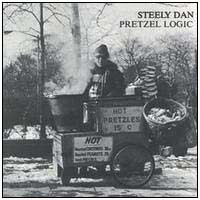| Most rock & roll bands are a tightly-wound
unit that developed their music through years of playing in garages and clubs around their
hometown. Steely Dan never subscribed to that aesthetic. As the vehicle for the songwriting
of Walter Becker and Donald Fagen, Steely Dan defied all rock & roll conventions. Becker
and Fagen never truly enjoyed rock -- with their ironic humor and cryptic lyrics, their
eclectic body of work shows some debt to Bob Dylan--preferring jazz, traditional pop,
blues and Rhythm & Blues. Steely Dan created a sophisticated, distinctive sound with
accessible melodic hooks, complex harmonies and time signatures, and a devotion to the
recording studio. With producer Gary Katz, Becker& Fagen gradually changed Steely Dan
from a performing band to a studio project, hiring professional musicians to record their
compositions. Though the band didn't perform live after 1973, Steely Dan's popularity
continued to grow throughout the decade, as their albums became critical favorites and
their singles became staples of AOR and pop radio stations. Even after the group disbanded
in the early '80s, their records retained a cult following, as proven by the massive success
of their unlikely return to the stage in the early '80s.
Walter Becker (bass) and Donald Fagen (vocals, keyboards) were the core members
of Steely Dan throughout its variety of incarnations. The two met at Bard College in New
York in 1967 and began playing in bands together shortly afterward. The duo played in a
number of groups -- including the Bad Rock Group, which featured future comedic actor
Chevy Chase on drums -- which ranged from jazz to progressive ... read more
|



